What to Know Before Renting a Car in France
Renting a car in a country like France can be the perfect way to explore new landscapes from a different perspective and to experience the countryside with total freedom.
I was very cautious during my first few visits to France and opted for public transportation. However, when visiting Provence I realized that without a car it wouldn’t have been the same. Since then I’ve rented a car on numerous occasions and driven daily when I used to live in France with my family.
Driving in France turned out to be easier than expected (although maybe not in Nice, haha!) and I’ve done it a bunch of times ever since: solo, with my husband, with a baby, cat – you name it.
Here are some basic things to know about renting a car in France that will help make your experience as smooth and convenient as possible.
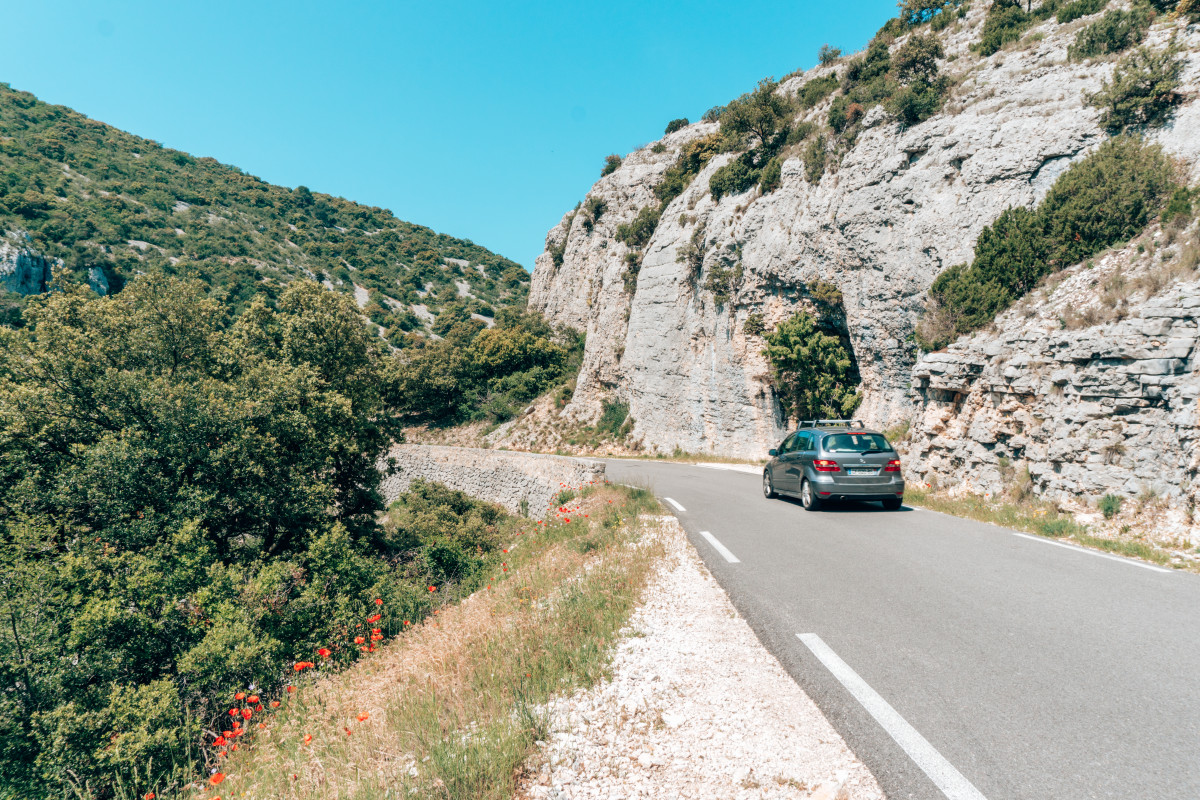
Is it a Good Idea to Rent a Car in France?
Renting a car in France is almost always a good idea because it allows you to visit places at your own pace and follow your timetable. It’s always good to have the freedom to avoid busy bus or train times and to be able to travel in the early hours of the morning or late at night if that suits you better.
This, of course, depends on where you are in the country. While you can get to some castles in Loire Valley without a car (I’ve done it myself), visit Giverny or Auvers sur Oise, or really anywhere with close proximity to Paris without any issues, when it comes to southern France things are slightly different.
France has a very good public transport system, with an efficient high-speed rail network but these only run at specific times and may not go to smaller remote areas that may be on your list.
This includes famous lavender fields in Valensole and other fantastic spots in the South of France. Check out my proposed itineraries for the Provence & French Riviera road trip.
Having your own wheels can also often work out much cheaper than taking a busy organized tour or getting a taxi – like for instance to Mont St-Michel.
The roads themselves vary from place to place but are mostly well-kept. The thing you may want to be wary of is driving in busy city areas like Paris. The roads in the city can be quite narrow, busy, and confusing which could increase the risk of scratching the car if you aren’t used to it. This can be quite frustrating and costly but it’s also difficult and expensive to find parking in cities.
Unless you’re staying in the outskirts of Paris, I’d say rent your car after you’re done exploring the city of love.
Essentially, you’ll be better off walking or cycling around the city and most central areas (the ‘centre ville’) are pedestrian-only areas anyway. However, it’s definitely a good idea to rent a car when traveling out of the city and into smaller towns and countryside areas.

Driving a Car in France with a Foreign License
An international driver’s license in France isn’t required by law.
It’s generally recommended to get an international driving license translated from your native language if it’s not French. These are not difficult to obtain and usually cost around $20.
If you’re from the US and you’ll be in the country for less than 90 days (basically the length you’re allowed to stay in the Schengen zone anyway), you can use your US license.
Do remember that although the legal driving age is 18 in France, you do have to be at least 21 years old in order to be able to rent a car. Some places may ask you if you’ve had your license for at least a year.
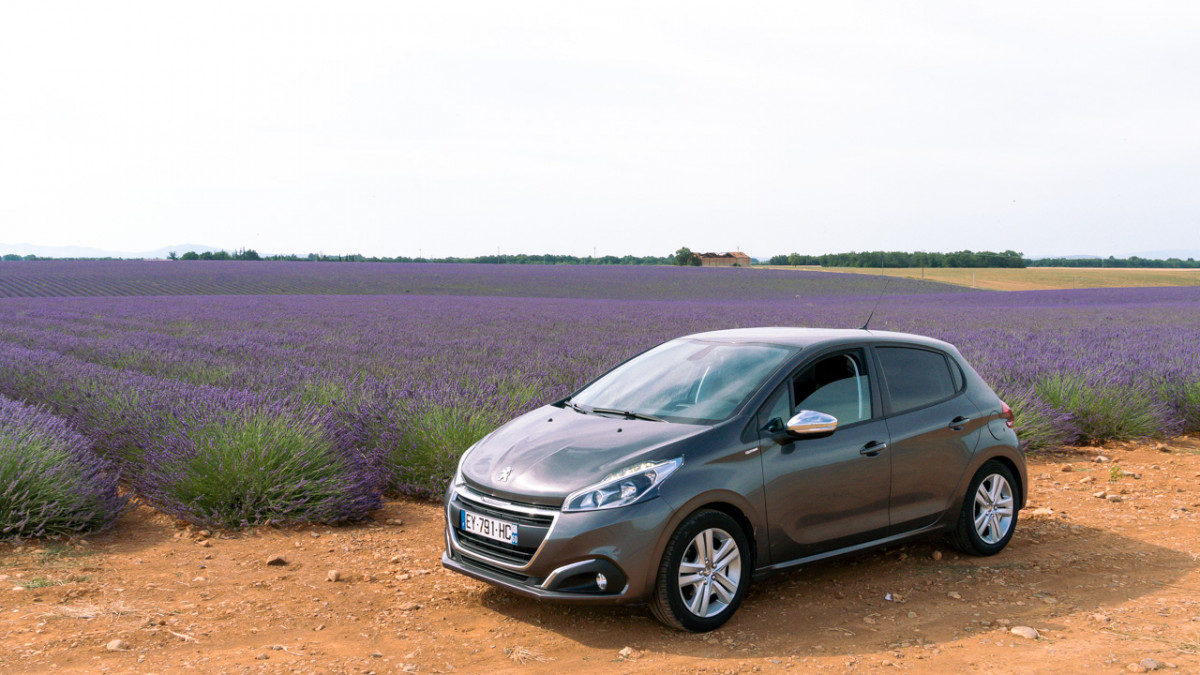
Main Requirements for Renting a Car in France
If you plan on driving in France, you need to be aware that there are certain requirements. The following are the documents that you must have with you at all times and other driving requirements for legally driving in France.
- You need to be over 18 years
- Valid Driver’s License: issued over a year before renting a car
- Current registration of a rental
- Valid Passport: It includes everyone in your car, especially when driving near French borders
- Valid Car Insurance
- Credit Card to Pay the Deposit (or debit if the rental agency agrees)
Car Rental Insurance in France
When driving in France you’ll need to be internationally insured beforehand and you will have to carry show proof of insurance identification, license, and vehicle registration when on the roads, in case you get stopped.
Insurance is generally included in rental prices in the form of unlimited third-party liability insurance which covers damage and injury incurred by a third party and their vehicle, even if you are responsible for it.
However, this insurance does not cover damage or injury to the driver of the rented car or their car, so this may come at an extra cost.
When you rent a car you will have the option of purchasing what’s known as a collision damage waiver (CWD) or deductible insurance but you may want to compare some prices first because these could work out to be very expensive.
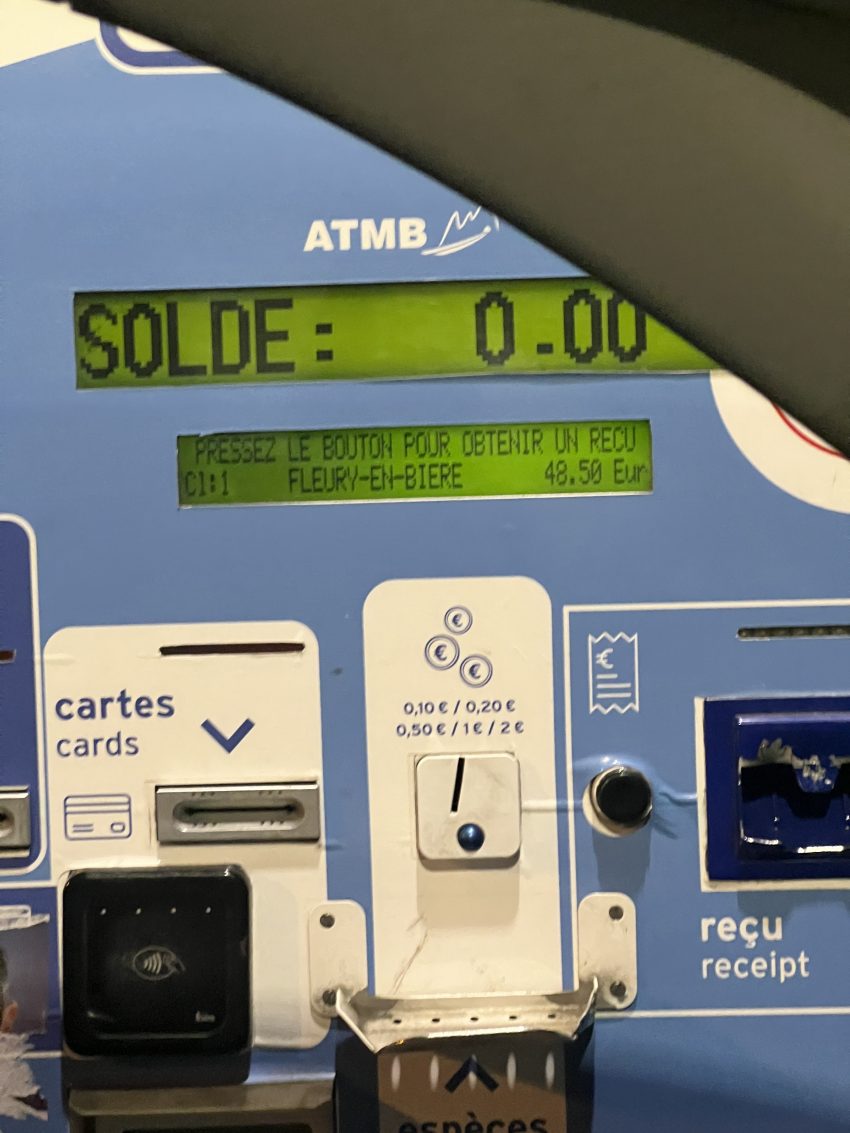
How Much Does it Cost to Rent a Car in France?
Prices can vary depending on the company, season, and car, but most places will offer a discount if you reserve the car a while in advance of your arrival in France.
It usually costs about $30-60 per day for the cheapest automatic car before adding additional insurance, fuel or tolls.
Bigger cars can be more expensive so you may want to opt for a smaller vehicle which will also benefit you on smaller roads. However, a big car can sometimes be better on gas. When we had a big Citroen Space Tour and drove across the country I was impressed by how little gas it used.
Renting a manual car is always significantly cheaper than an automatic one. Automatic cars aren’t super common among rental agencies.
You may want to check out Discover Cars to compare different prices for your dates and find the best deals. You can get some good deals from world-renowned rental companies like Avis, Sixt Car Hire, Europcar and others.
I personally rented from different providers at Marseille Airport, Nice Downtown, Nice Airport, Paris Downtown, Annecy Town, and Paris CDG Airport that booked through Discover Cars. I also use them all the time when I’m in Italy (and as I lived there I must have rented about 30 times if not more).
IMPORTANT: Avoid Rhodium at Nice Airport at all costs. It may seem cheaper and therefore attractive, but last time I rented from them they tried to scam every customer they had, refusing already purchase coverage, denying a particular car you booked unless you pay extra, and other things an unreliable operator would do.
The more costly aspect comes in when considering fuel and highway tolls, but that’s to be expected of any more developed area. Highways are very expensive so keep it in mind!
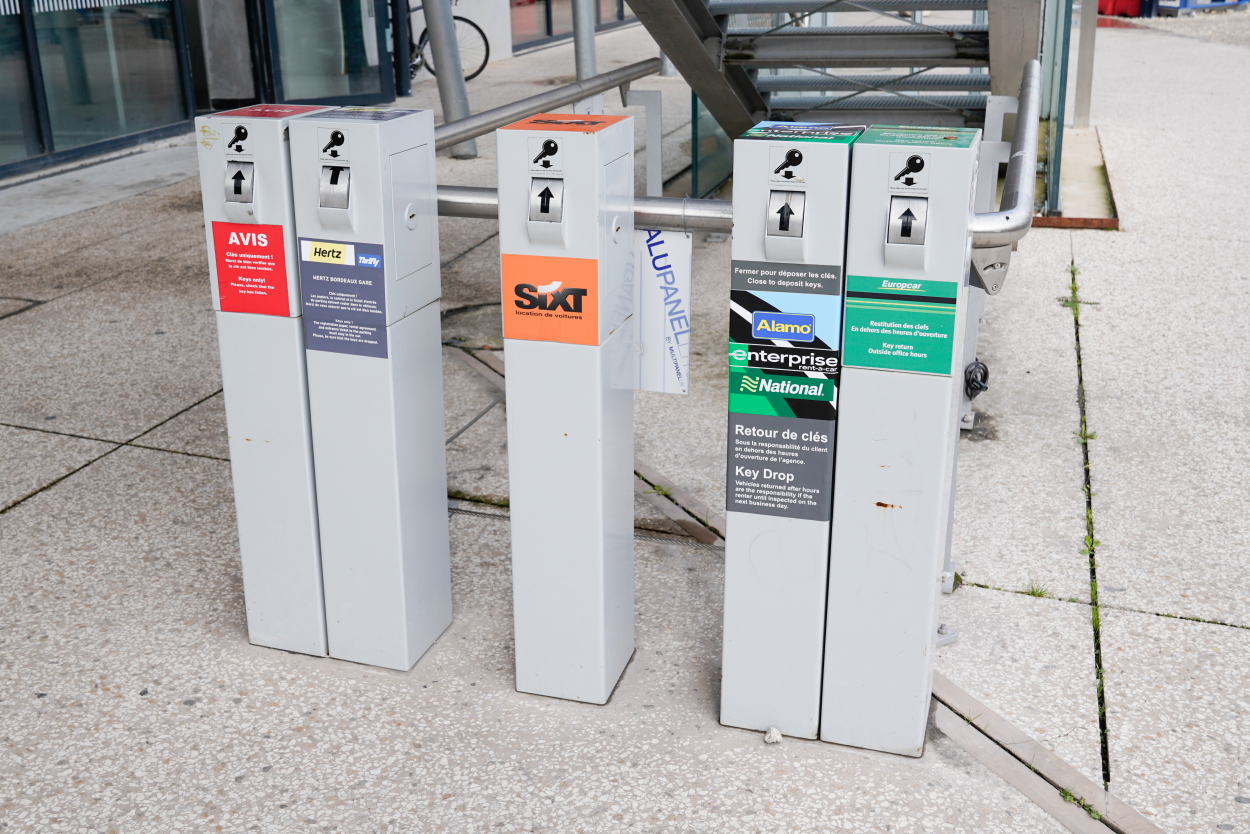
Crossing Borders from France to Monaco & Italy with a Rental Car
You’ll have to double-check with your rental company beforehand if they allow you to take the vehicle into another country, to ensure that your insurance remains valid wherever you go.
Usually, traveling to Monaco and Italy in a car rented in France should not be a problem, as long as you have valid insurance.
The only thing I had to show was my passport, as I was stopped by the police. They frequently do these checks to make sure that non-EU tourists don’t overstay their 90-day Schengen visas.
Crossing Borders from France to Switzerland with a Rental Car
You can drive your French rental car to Switzerland, as long as you purchase “vignette” at the border. It’s a sticker that you need to place on our car’s dashboard to pay for Swiss highways. It costs 40 Swiss Francs and is valid for a year.
While you just drive through the border without stopping, you cannot drive in Switzerland without the vignette. Agents are controlling if everyone got one at the border and also on the road – fines in Switzerland aren’t exactly low, so better be safe than sorry.
You also cannot return a car rented in France in Switzerland.
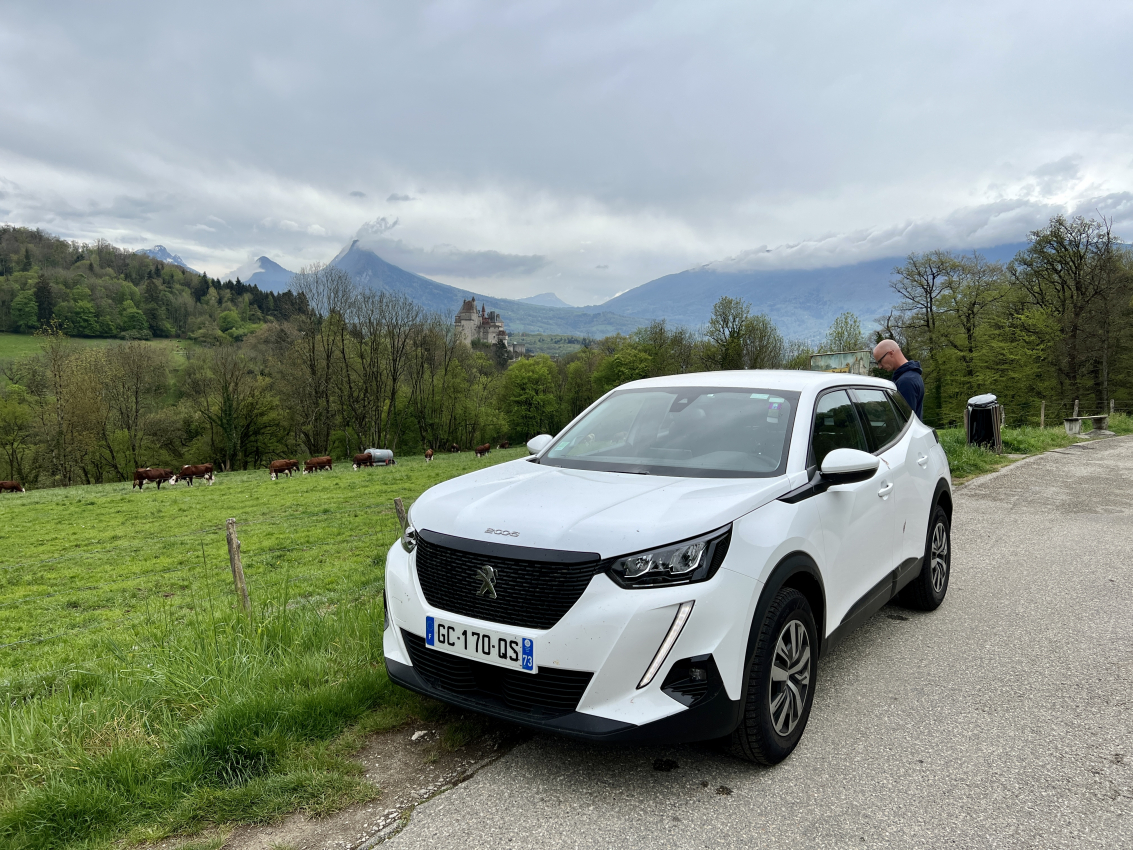
Don’t Forget About Travel Insurance
Don’t forget to arrange health insurance before heading to France. The easiest and most reliable travel insurance is Safety Wing. Get it before your trip to skip unnecessary troubles that might ruin your holidays!
Why Should You Rent a Car in France?
Renting a car in France will give you the unique chance to see all of the smaller towns away from the busy cities and crowded tours and public transport, that you may otherwise not be able to see otherwise.
Explore this beautiful European country at your own pace and your timetable. Make your way through the South of France and the picturesque areas like Provence and the French Riviera.

Any questions? Don’t be afraid to ask me!




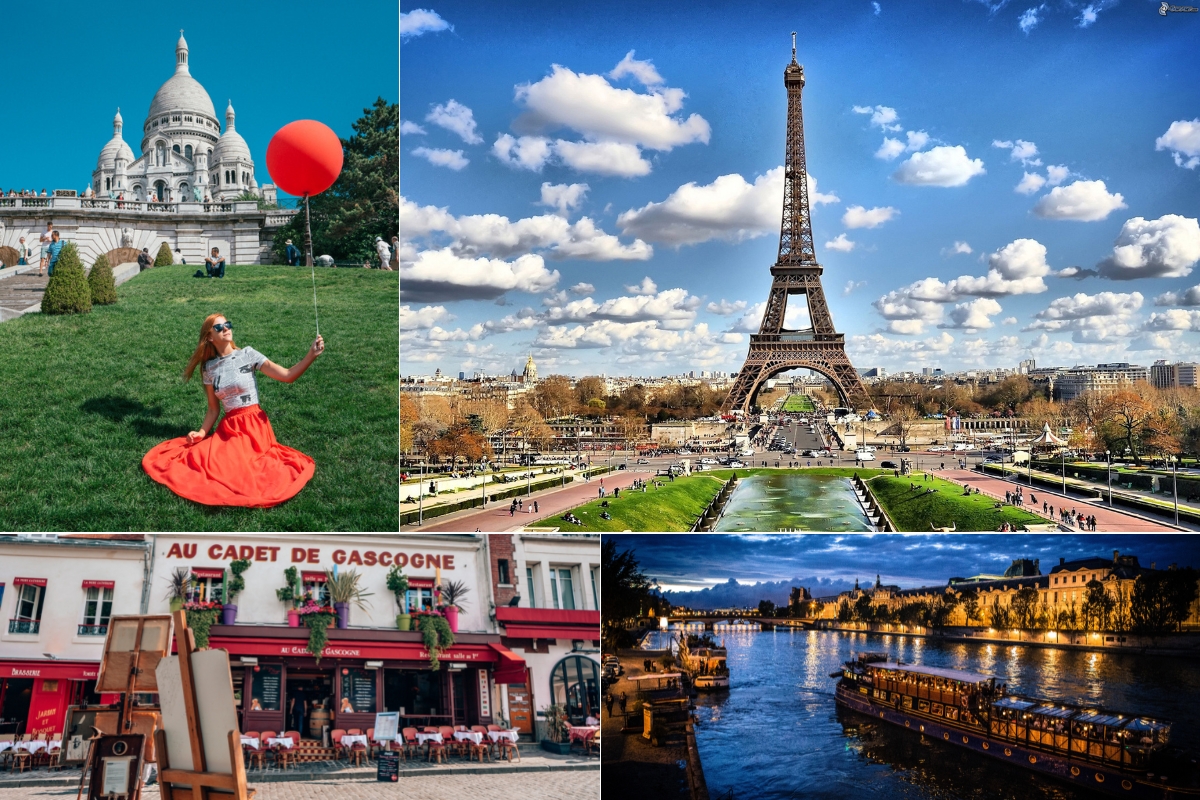

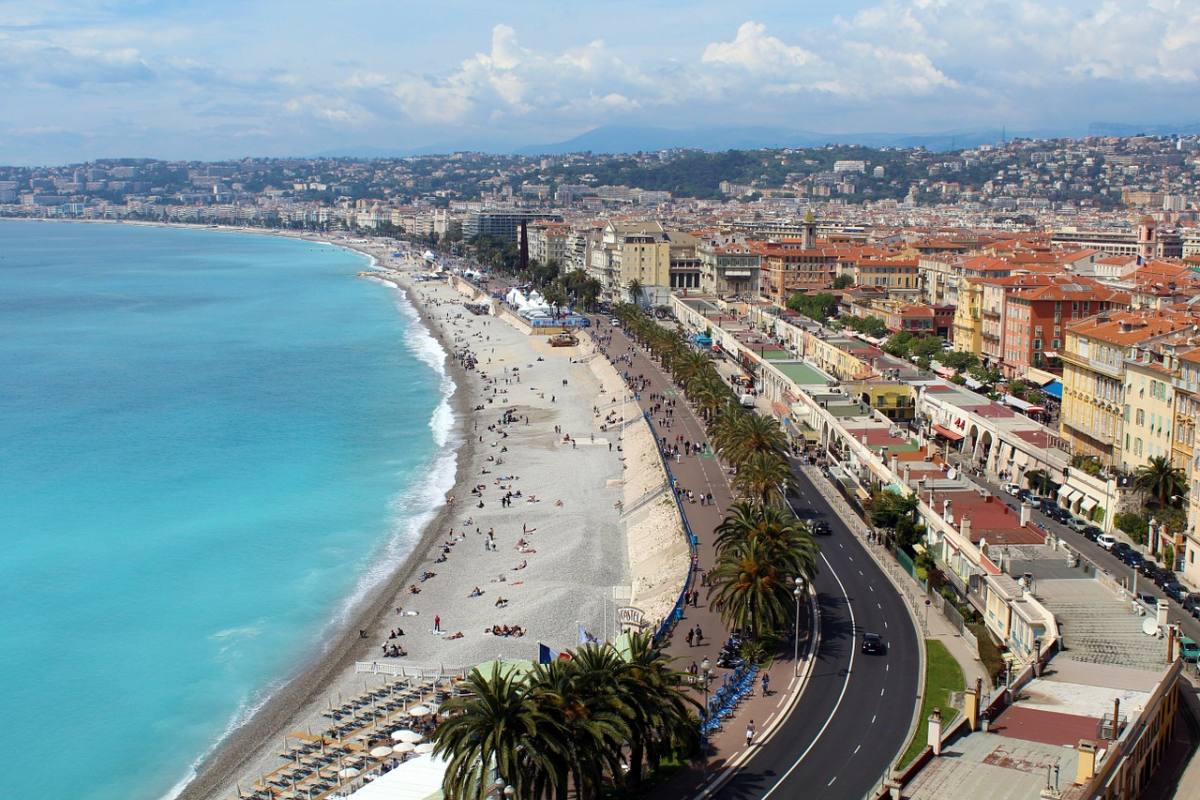
This was incredibly helpful – thank you! We are planning a trip this December. 🙂
Have you rented from Sixt at CDG. We are going next April and traveling to the Normandy region.
Not at CDG but used Sixt at Marseille Airport.
we will need to travel from Homps (final drop off destination after a barge trip) to Barcelona. Is car rental available in Homps, and can the car be dropped off in Barcelona?
So, as a US citizen I do NOT need an international license or permit?
If you’re a tourist you don’t.
Hi! We are planning to drive from Chamonix to Cinque Terre. Do most car rentals let you drop off the car in another country?
Between France and Italy it’s usually not an issue but naturally involves an extra fee which might be high. You can always drop the car, take a train and get another one Italy too to avoid the fee.
Do you drive a manual transmission? Do you know if it’s harder or more expensive to get an automatic when renting in France?
It’s harder and usually more expensive to rent automatically, but not impossible – especially if you’re starting at major airports.
Hi. I’m planning to rent at Caen, go through the Normandy beaches, Mont St Michel and around the Louire Valley. The rental companies are saying 765 km included. I think I’ll be above that, but I can’t see where they say how much extra mileage will cost. If it’s nominal, I don’t mind, but if it’s going to be crazy high . . . I just want to know. Thanks!
That varies per company so best is to call and check, it’s usually a rate per km :/
@Cassandra,
Hi
I’m planning similar trip late April 2023. Curious what you ended up doing about rental car, where you picked it up and the return. Any thoughts on your itinerary? We currently have 3 nights booked Bayeux, 1 night Mont St Michel. Have 5 days after that to plan. Thinking Loire Valley and maybe Bordeaux. Thoughts?
We are taking the train immediately upon arrival from Paris to Rennes and than travel by auto for four days to Caen where we will return the car. This is four five passengers. Any advice? thank you
Be very careful if you need to drive through Paris. Otherwise, you’ll be fine in on your route 🙂
Do you recommend adding on any of the insurances that are optional? I opted out of all of them but have been reading on line of people being hassled for damage that was already there.
It’s possible, but so far we’ve never had any issues apart from the airport in Marseille.
Hello, we are traveling from US to London to Paris. We will look to rent a car once we are done in the city. Do we have to get international car insurance coverage here while in the states before we are able to rent a car? And if so then do we only need to select a collision type of coverage for the rental itself while we have it? We would also like to rent a car in the UK so I am guessing international coverage would be helpful.
Unless you buy directly from the car rental if something happens to the car you need to pay out of pocket for everything (including the cost of the car if it gets stolen or totaled) and then claim it back with the insurance you have afterwards.
Thank you for the info. It was very helpful
Is it more expensive to rent and return at the airport or train station rather than elsewhere in town?
We plan to arrive in Bordeaux by TGV after 4 days (carless!) in Paris. Then we will pick up a car at either the train station (more convenient) or somewhere in town not far from the station.
Then 11 days later, we will drop off the car in Geneva, again either at the airport or somewhere in town not far from the airport.
And, do youknow any way to avoid the vignette charge for that tiny bit of driving in Switzerland for about a half hour?!
I actually have experience with this as I lived near the Swiss border and Geneva and I’m afraid your plan won’t work. You cannot drop the car off in Switzerland if you rented it in France (you can drive to Switzerland with a vignette, but not drop it off). The best solution for it, and actually cost saving also on vignette, is to drop off the car in Annecy and order a pre-booked transport to the airport in Geneva. You could also take a bus from Annecy to Geneva airport, it’s super cheap.
Thank you for this article! We are planning a trip to Provence this June. We have rented cars throughout Europe without issue (Bruges and Ostuni have been our most interesting adventures behind the wheel!), but I have a question specifically about renting in/near Nice.
Do you recommend we rent a car from the airport before we stay in Nice for a couple days? Or rent off-airport once we prepare to set out from Nice? We will be heading out west from Nice for the remainder of our stay. Not sure whether it will be more of a hassle trying to get to an off-airport location. Thanks for any advice you have!
Hi! I rented from Nice airport and Nice downtown, so I can attest to both options. You can totally do Nice without a car, but it depends on what you want to do. If you haven’t been yet, I highly recommend popping into Eze, Villafranche sur Mer, or even Villa & Jardins Ephrussi de Rothschild. All of these places are east from Nice, so not on your way later, so you might want to have a car in Nice for that. I’d say driving in Nice would be comparable to Ostuni (all my taxi drivers in Nice are joking that they mix up with Italian drivers) and you could store it at some of the parking garages. In fact, we got and returned a car from one of them. Honestly, if you just want to hang otu in Nice you might take a bus or taxi (although the bus is absolutely perfect surprisingly even with luggage) to the airport and get a car any time.
@Anna Karsten,
Hi is it better to pick up a car at the Nice airport or downtown, we are picking up the car at the end of our stay in Nice heading to St. Maxime.
Thanks for your thoughts.
Ann
In this case airport because then you’ll just get out of Nice in a car and head straight to St Maxime skipping the traffic, but if it makes a huge price difference downtown isn’t bad either.
Planning a 2 week trip to Loire Valley and then Bordeaux region in early June. We plan on renting a car. Are sleeping accommodations tough to get if you don’t have advanced reservations? We don’t have a set itinerary so we’d like to stop where the day takes us. By the way, loved your article about car rentals. Thank you.
In early June yes, will be tough. You might find some, but also wouldn’t be surprised if there’s nothing available and I’m saying this from my last year’s experience and planning another trip for this year for June. In fact, I booked the last room available in the entire Nantes (which is nearby technically) for a certain night and it was like two weeks ago.
@Anna Karsten,
Hi Anna planning on renting out of Bayeaux FR and dropping of at Chartes Is there a large dropoff fee if the dropoff is different from the pickup place? Thanks
Yes, there’s always a fee for a different drop-off location but it varies depending on the specific place. Plug everything into the system and it will give you the full price 🙂
Great information. We’re spending three nights in Paris and then traveling to Chinon for 3 nights and then 3 nights in Lyon, then we’re traveling to Amsterdam for a river cruise. Should we rent a car in Paris and then return it to Paris and train to Amsterdam or just take trains? Thanks for your help!
Are you planning on venturing outside of Lyon? You will reach Lyon faster by TGV train from Paris so I’d only rent a car for Chinon part and return it in Paris, then train to Lyon and Amsterdam.
Thank you for the helpful post Anna.
We’re flying into Paris on 22nd April and out on 6th May. We plan on spending 4 Days in Paris. And then do Burgundy region, maybe Dijon, Beaune, and Lyon and then Provence region. Haven’t decided how many days and which places yet but would like to drive around in Provence to check out the more rural areas.
How would you suggest we go about it and for which part should we get the car? From
Paris all the way or somewhere along the way?
Thanks a lot
Having driven on the road from Paris to Dijon and further to Provence I’d probably rent a car in Lyon. The highway from Paris is pretty boring and you’ll spend about 50 euros in tolls alone. Easier to just take TGV to Lyon, then rent a car.
I am going to Paris in June. What rental car companies have drop off service to your hotel? I am not driving in Paris. On our 4th day we will be leaving Paris and driving north to Arras.
Great question… I don’t know of any to be honest and last time we did it we were told no even at the fanciest hotel in Paris.
We are flying into CDG in July, plan to get a TGV upon arrival to Avignon. We plan to rent a car in Avignon for our 1 week stay in Provence. We then plan to drive from Provence to Nancy to visit family and will then take a TGV from Nancy to Paris for a few days before we fly home. Any cautions with this plan? Thanks for the helpful info.
As long as you prebook accommodation and even TGV because July will be during high season you’ll be fine 🙂
“you will have the option of purchasing a collision damage waiver (CWD) or deductible insurance but you may want to compare some prices first because these could work out to be very expensive.” Q: how and where would we compare prices? I don’t understand your statement.
When renting a car in France and traveling to other parts of Europe, is it necessary to purchase a first aid kit, reflective vest and reflective triangle? I’ve been told these are required.
Yes, but it’s normally provided with the car rental. They make sure to let the drivers from the UK know to have it in their private cars.
Thank you so much for this information! Very helpful!
We are planning a trip to France next month and want to rent a car to drive through the different wine regions as well as the bordering countries. You mentioned Switzerland, Italy, and Monaco in your article, however, we are also planning on visiting Belgium, Luxemburg, Germany, & Liechtenstein. Are there any additional requirements for entering these countries (like Switzerland)? Thanks!
Dear Anna,
Are you actually aware of any car rental solutions in France that do not require the driver to have held a license for at least 1 year? You mention that some may require it but I haven’t been able to find a single one that doesn’t, and have a trip planned shortly where having a car would be very useful.
Thanks,
James
Have you ever rented an electric car in the south of france? We are looking to go from Marseille to Nice and stopping at one or two places during a five day stay. I am worried about parking in the smaller cities. But being modern france thought they might have electric charging in city centers or at major hotels.
Dear Anna,
Ive been travelling to La Londe Les Maures for years by car and train from London . I am thinking of flying to Marseille or Nice and renting a car for three weeks next year.
As. I understand, you can purchase CWD from a renting agency or have your own insurance policy. What would be the difference between these two options?
I am especially concerned about small bumps to the car body common in a supermarket car park.
As I understand , if you have your own insurance , independent from a renting agency, in case of the damage you pay and then you claim from your insurance.
Would it be the same if I buy an insurance policy from a renting agency?
And if I purchase insurance from a renting company will they reserve some limit for themselves on my credit card?Thank you Dmitry
I
If you buy full coverage from a rental agency then you don’t need to pay anything in case of bumps. They might still hold a deposit on your credit card, but much smaller.
Hi, my husband and I are going to France next month. We are arriving Paris on a Saturday and thinking to explore Paris until Tuesday. Then we were going to rent a car and go to Normandie and go to Mont Saint Michel and then to Bordeaux, and finally meet some friends in fitou on Thursday or Friday and drive back to Paris on Sunday and fly home Monday. Is there a leg of this journey that it would make sense for us to take public transport? And, does this timeline even make sense or are we trying to do too much in a few days?
It’s doable for sure, but with some adjustments. First, squeezing Normandy beaches and Mont Saint Michel from Paris by renting a car is a LONG day. You can do either with public transport, but both on the same day is tricky.
Now, Bordeaux is a completely opposite direction and I’d suggest taking TGV from Paris because it’s 2h vs 5.5h by car. To get from Bordeaux to Fitou is another almost 5h by car and no great public transportation options, so a car is a must.
That said, you can keep the car for the entire trip but you will be driving a ton because just to Mont Saint Michel is over 4h from Paris and that’s not taking into an account different areas of Paris and horrendous traffic coming in/out of the city.
Hi, We will arrive in CDG and need to get to the Burgundy region then lyon. There will be four of us with luggage. Is it easier to travel by TGV to Le Creusot train station then rent a car or rent a car at CDG and drop off 4 days later in Lyon? Can I rent a car at CDG and return it to Lyon?
You can return a car at a different location, usually for a fee but that’s not an issue. How much luggage are we talking though? If all 4 of you will have a carry on suitcase that won’t fit in a regular car, you will need a van. Easiest to rent at CDG and return in Lyon.
Hi
My family inform me that warning signs, hi viz vests and breathalyser are a legal requirement when driving in France. Are these generally included in the hire car?
Yes they’re normally included.
Do not use SIXT!!! We tried to cancel our reservation 18 hours after making it for a trip in France and we could not get our refund. Look on trip adviser they have 393 Terrible reports. That says it all!
Anna, arriving by cruise ship on 09/16/23 at Le Havre Central Terminal. Looking at renting a car for the day from 8am to 4pm to go to the Canadian war cemetery (Juno). Can you help me out
Hi Anna – Great post, thank you! We are traveling to Paris and want to see Mont Saint Michel while we are there. We would like to go out on Friday morning and return on Saturday, but train schedules appear limiting, so renting a car may give us more flexibility and be able to see more along the road. We are renting from and returning to Paris (likely staying in city center while we are there). Where is the best place to rent from to avoid driving in Paris as much as possible? Should we taxi or train to the airport and rent from there? Or are there a recommended car rental agencies on the outskirts of town that we could get to easily with train/metro and rent early morning Friday and return it Saturday evening before taking train/metro back into Paris? Thanks in advance for any help you can give!
You could do La Defense/Nanterre area 🙂
Hi Anna!
What is your suggestion to get from Paris to Normandy Beaches? What is the best town to stay in for WW2 beach tours? Traveling with 3 kids and wondering if best to take train and then rent car while there to explore some of the area for a few days? Or better to rent car in Paris?
I would rent a car in Paris, usually around La Defense area is best if you want to avoid driving in Paris city center.
Hi planning on taking a train from Paris to Caen, then renting a car to travel through France and Portugal for 2 weeks then back to Caen. Will I have any issues crossing the borders. Possible going to Spain as well. Thoughts
Do car rental companies in France have policies regarding an upper age limit. I am 82 years old. Will I be able to rent a car in France. Can you advise me on the policies of specific companies in this respect. Thank you.
Most companies might have an inusrance surcharge for people over 70, but you need to reach out to a specific rental company directly.
Would you recommend a car rental agency verses Turo when renting in Paris? We want to drive to Mont st michel. Any tips would be greatly appreciated.
We are traveling to France early March. We are arriving in Paris and taking the train down to Marseille for a few days. I wanted to rent a car in Marseille to travel over to Nice where we will be departing back to Paris a few days later. Do you recommend having the car for the week or just for the one day that we are traveling between Marseille and Nice? I am concerned about parking as I have read it is difficult in both the cities and we are comfortable with public transportation so our day trips to Aix and Monaco can be done without the car unless you think it will be worth having it the whole time. My main reason for having it was to enjoy the ride along the coast between Marseille and Nice. Thank you.
The road from Marseille to Nice isn’t really a coastal road though. Only a small part from Cannes to Nice, but that’s also the road with the worst drivers 😉
A car can be good as you can stop at other spots on the way to Monaco like Eze, Villafranche sur Mer, smaller towns around Aix. Check my other posts on spots worth seeing in the area:
https://annaeverywhere.com/south-of-france-provence-itinerary/
https://annaeverywhere.com/french-riviera/
What about driv8ng into Belgium from France?. Any tips there about crossing the border
Belgium to France there are no specific requirements.
This site looks fantastic – would love to receive new posts and have access to former posts!
Merci beaucoup, Anna! What about electric vs. hybrid vs. gasoline engines? We are renting at CDG, We’ll be working our way down to the Sarlat area, and then back up to Paris, with a number of side trips. We are going to some pretty “off the beaten path” places and I worry about having an all-electric vehicle and then having to find a charging station.
Are rental companies mostly dealing in gasoline engines? If we are offered an electric, can we refuse?
Thank you!
If it’s a tesla then it’s easy because there are many chargers pretty much everywhere, but otherwise I’d suggest hybrid at least. Unless it specifically states that it’s an electric vehicle, then it’s unusual to be handed an electric car.
Thank you! I appreciate that!